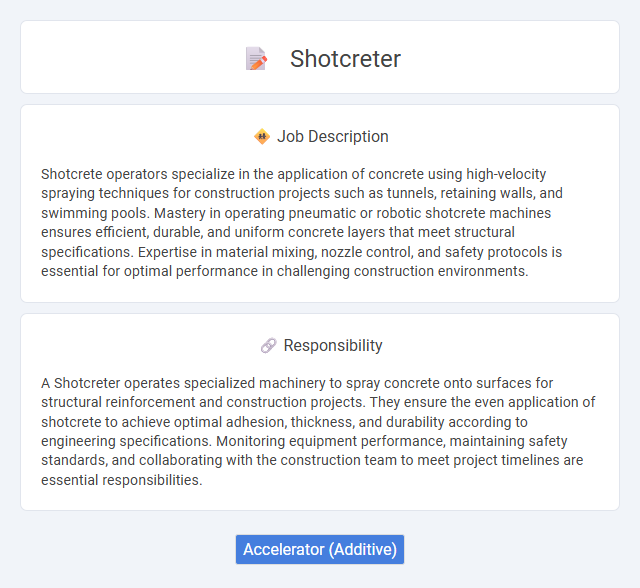
Shotcrete operators specialize in the application of concrete using high-velocity spraying techniques for construction projects such as tunnels, retaining walls, and swimming pools. Mastery in operating pneumatic or robotic shotcrete machines ensures efficient, durable, and uniform concrete layers that meet structural specifications. Expertise in material mixing, nozzle control, and safety protocols is essential for optimal performance in challenging construction environments.
People with good physical stamina and strong attention to detail are more likely to be suitable for a Shotcreter job, as the role often involves heavy manual labor and precise application of concrete. Those with respiratory issues or limited mobility may face challenges in this work environment due to exposure to dust and the physical demands required. The probability of success increases for individuals who can maintain safety protocols and work effectively under potentially harsh conditions.
Qualification
Shotcreters require specialized training in operating shotcrete machinery and understanding concrete mix designs to ensure precise application. Proficiency in reading blueprints and knowledge of safety protocols are essential to execute structural reinforcement tasks accurately. Certifications in construction safety and prior experience in concrete spraying significantly enhance a candidate's qualifications.
Responsibility
A Shotcreter operates specialized machinery to spray concrete onto surfaces for structural reinforcement and construction projects. They ensure the even application of shotcrete to achieve optimal adhesion, thickness, and durability according to engineering specifications. Monitoring equipment performance, maintaining safety standards, and collaborating with the construction team to meet project timelines are essential responsibilities.
Benefit
Shotcreting probably offers significant benefits in construction, such as rapid application and strong adhesion on complex surfaces, which may reduce project timelines. Its ability to form durable, waterproof layers likely enhances structural integrity and longevity. This job may also provide workers with specialized skills that increase employability in infrastructure and civil engineering sectors.
Challenge
Shotcreter work likely involves demanding physical challenges, requiring strong precision and coordination to apply concrete effectively on vertical or overhead surfaces. The role probably demands adapting to varying site conditions and maintaining safety standards under potentially hazardous environments. Mastery of equipment operation and material handling is essential to meet quality and efficiency expectations consistently.
Career Advancement
Shotcrete operators develop critical skills in concrete application for infrastructure projects, enhancing their expertise in high-demand construction techniques. Mastery in shotcrete technology opens pathways to supervisory roles, project management, and specialized certifications such as ACI Concrete Field Testing Technician. Continuous training and hands-on experience enable shotcrete professionals to advance rapidly within construction firms, contributing to large-scale commercial, residential, and civil engineering projects.
Key Terms
Accelerator (Additive)
Shotcreters specializing in accelerator (additive) application play a crucial role in enhancing concrete curing speed and strength development in construction projects. They precisely mix and apply accelerators with shotcrete to improve adhesion and reduce setting time, crucial for tunneling, slope stabilization, and underground works. Mastery of accelerator types and proper dosage ensures optimal performance and durability of sprayed concrete structures.
 kuljobs.com
kuljobs.com